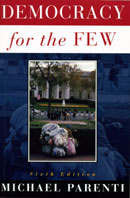

|
|

Democracy for the Few
Parenti, Michael
Publisher: St. Martin's Press, New York, USAYear First Published: 1988 Year Published: 1995 Pages: 354pp Price: 20.50 ISBN: 0-312-05233-2 Resource Type: Book Cx Number: CX6247 How does the U.S. political system work and for what purpose? What are the major forces shaping political life and how do they operate? Who governs in the United States? Who gets what, when, how, and why? Who pays and in what ways. These are the central questions investigated in this book. Abstract: Michael Parenti proposes in Democracy for the Few that the America is not a pluralistic democracy as it is idealized to be. Conversely, he believes it is a plutocracy where an unelected wealthy capitalist class controls both America's social and political institutions, which they use as tools to legitimize their rule and further their interests. Although democratic in name, Parenti believes the structure of capitalism prevents true democratic freedoms from being realized. He emphasizes that what makes a system democratic is not only its procedures, such as voting, but its outputs, such as an equal distribution of wealth. Parenti offers a comprehensive and critical look at the entire capitalist American system. He makes frequent use of references and footnotes to support his arguments. Early chapters are devoted to the historical development of America's political system. From the birth of the American Constitution to the present day, Parenti describes how capitalist interests have trumped the interests of the working class. Later chapters are dedicated to modern American institutions such as Congress and the mass media. He illustrates how these institutions provide the illusion of the possibility of democratic change, while actually working to maintain the status quo. Parenti does admit that there have been some democratic victories in America. However, he stresses they were hard-fought struggles that succeeded despite, and not because of, the current system. Nevertheless, he believes that there are limits to democratic reform because capitalism, by its very structure, is incompatible with democracy. In the end, Parenti suggests that socialism might be the answer. Although he concedes he does not know what kind of socialism is best or how to achieve it, he believes it is necessary to replace the capitalist system with a more democratic system. [Abstracted by Jared Ong] Table of Contents Preface 1. Partisan Politics Beyond Textbooks The Politico-Economic System 2. Wealth and Want in the United States Wealth and Class Who Owns America? The Dynamic of Capitalism Productivity and Human Needs The Hardships of Working America 3. The Plutocratic Culture: Institutions and Ideologies American Plutocracy and Cultural Hegemony Ideology: Right, Center, and Left U.S. Public Opinion: Which Direction? Democracy: Form and Substance 4. A Constitution for the Few Class Power in Early America Containing the Spread of Democracy Plotters or Patriots? Democratic Concessions 5. The Rise of the Corporate State Serving Business: The Early Years The Not-so-Progressive Era The New Deal: Hard Times and Tough Reforms 6. Politics: Who Gets What? Welfare for the Rich Taxes: Helping the Rich in their Time of Greed Deficit Spending and the National Debt Military Spending: Buttering the Guns Economic Imperialism 7. Health, Environment, ad Human Services: Sacrificial Lambs The Poor Gets Less (and Less) "Urban Removal" and "Mess Transit" Health and Safety for Nobody Ecological Disaster 8. Unequal before the Law Criminal Law: A Double Standard Victims of the Law Nonenforcement: When the Law Fails Us 9. Political Repression and National Insecurity The Repression of Dissent Political Prisoners, USA Toward a Police State The National Security Autocracy 10. The Mass Media: For the Many, by the Few He Who Pays the Piper The Ideological Monopoly Official Manipulation Political Entertainment Room for Alternatives? 11. The Greatest Show on Earth: Elections, Parties, and Voters The Sound and the Fury The Two-Party Monopoly The Right to Vote Voter "Apathy" and Participation Democratic Input 12. Who Governs? Leaders, Lobbyists, or Labor? The Ruling Class Lobbyists: Special Treatment for Special Interests Grass-Roots Lobbying Labor Besieged 13. Congress: The Pocketing of Power A Congress for the Money A Special-Interest Committee System Helping Themselves: The Varieties of Corruption The Legislative Labyrinth A Touch of Democracy 14. The President: Guardian of the System Salesman of the System The Two Faces of the President A Loaded Electoral College The "New Federalism" Ploy The President versus Congress: Who Has the Power? 15. The Political Economy of Bureaucracy The Myth and Reality of Inefficiency Secrecy, Deception, and Unaccountability Bureaucratic Action and Inaction Serving the "Regulated" Public Authority in Private Hands Monopoly Regulation versus Public-Service regulation 16. The Supremely Political Court Who judges? Conservative Judicial Activism Circumventing the First Amendment As the Court Turns Influence of the Court 17. Democracy for the Few Pluralism for the Few Reform and the "Mixed Economy" Democracy as Class Struggle The Two Faces of the State What Is to be Done? Index Subject Headings
|